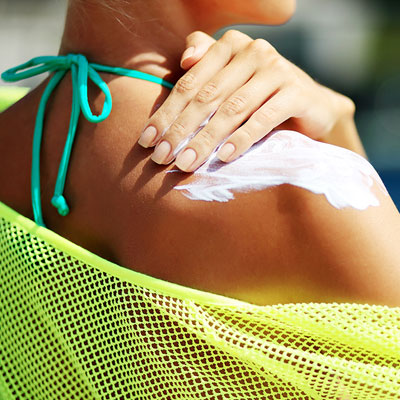Summer Skin Care

Say “hello” to summer but not to skin damage! Beware of getting sun-kissed skin because too much of it can cause skin damage. Although the skin uses sunlight to produce vitamin D, which is important for bone formation, too much of the sun’s ultraviolet light can be detrimental.
How long does it take the sun to affect our skin?
Skin damage from the sun depends on the amount of UV rays that are hitting the skin, and on a person’s skin type. People with naturally dark skin have higher levels of melanin and it can take longer before they burn, if they burn at all. On the other hand, people with fair skin have lower levels of melanin and their skin tends to burn in shorter amounts of time.
What are some options to prevent skin damage from the sun?
Use a cream cleanser that is not overly drying or harsh to your skin.
Skin cleansers that are overly drying can send a signal to the skin to produce more oil, creating a vicious cycle of dryness and oiliness.
Getting the skin clean without over drying keeps it stable and reduces the risk of irritation.
Use a moisturizer containing sunblock during the day.
The American Academy of Dermatology recommends daily use of a sunscreen with a sun protection factor (SPF) of at least 15.
Look for a broad-spectrum product that protects against both UVA and UVB rays.
Apply an anti-aging product at night.
Products that contains active ingredients such as ascorbic or retinoic acid (known as retinol) in over the counter products are good choices.
What are the best products for sun-damaged skin?
Look for products that contain retinol, glycolic acid, hydroquinone, vitamin c, and niacinamide to treat sun damaged skin. Although they can’t totally erase all the damage, they can, with regular use, make skin look brighter, smoother and younger.
Does age affect skin sensitivity?
The body, and especially skin, is constantly renewing itself through the destruction of old tissue and the creation of new tissue.
However, as we get older, the construction of new tissue slows down. Skin is especially suceptible to an age-related decline renewal.
Young Skin
- Sheds dead cells every 2 – 4 weeks and is replaced
- Has ample fatty lipids to hold moisture
- Well supported connective tissues
- Has adequate oil and sweat glands for moisture and to cool off the skin
- Blemish free due to less UV exposure
- Firm and smooth
Older Skin
- Slower renewal rate of skin cells
- Less fatty lipids and is thinner and easily gets dry
- Less supported due to loss of elasticity
- Has less oil and sweat glands leaving dry skin
- Age spots due to UV exposure over time
- Wrinkled and sagging
Other ways to care for your body during summer
Drinking plenty of water is especially important during the summer. The skin loses its moisture under the heat. So, to regain moisture, you must take in lots of water.
Wear loose, cotton clothes to reduce sweating and moisture loss.
Eating light meals during summer can help your skin gain nutrients.
Don’t consume food that contains oil or heavy ingredients, eat foods that will keep you feeling light at all times.


